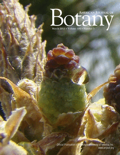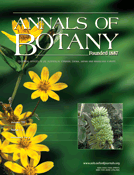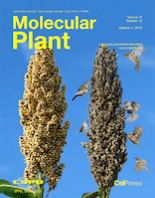
NEW PHYTOLOGIST
metrics 2024
Pioneering Research to Sustain Our Future
Introduction
NEW PHYTOLOGIST is a premier international journal published by WILEY, focusing on the field of plant science and physiology. Operating since 1902, this esteemed journal has established itself as a vital resource for researchers and professionals alike, offering cutting-edge research and insights into the complex workings of plants and their physiological processes. With an impressive impact factor and recognized in the top quartile (Q1) of both the physiology and plant science categories, it ranks #8 and #9 respectively in their fields, placing it within the top 2% of journals. NEW PHYTOLOGIST is not only essential for enhancing the understanding of plant biology but also for addressing global challenges such as food security and environmental sustainability. Although it does not currently offer open access, the journal remains committed to disseminating knowledge to a wide audience through institutional subscriptions and partnerships. This journal continues to drive advancements in plant science into the future, making it an invaluable asset for students, researchers, and industry professionals.
Metrics 2024
 3.01
3.01 8.30
8.30 10.20
10.20 305
305Metrics History
Rank 2024
Scopus
IF (Web Of Science)
JCI (Web Of Science)
Quartile History
Similar Journals

BIOLOGIA PLANTARUM
Nurturing Ideas, Growing SolutionsBIOLOGIA PLANTARUM, esteemed within the realms of horticulture and plant science, is a leading academic journal published by the Academy of Sciences of the Czech Republic, Institute of Experimental Botany. Established in 1959, this journal showcases innovative research and advancements in plant biology, focusing on a spectrum of topics including plant physiology, genetics, and biotechnology. With an impressive Scopus ranking in Horticulture (Rank #41/115) and Plant Science (Rank #221/516), it holds a significant place in the academic community, reflected in its Q2 and Q3 status within its respective categories. Although it is not open access, authors are encouraged to contribute to the growing body of knowledge that supports sustainable practices in agriculture and horticulture. Published in the Netherlands, BIOLOGIA PLANTARUM continues to foster collaboration and dialogue among researchers, professionals, and students dedicated to understanding and advancing plant sciences.

AMERICAN JOURNAL OF BOTANY
Exploring the Wonders of Botany and BeyondAmerican Journal of Botany, an esteemed publication by Wiley, serves as a pivotal platform for the dissemination of groundbreaking research in the fields of botany, ecology, plant science, and genetics. With an illustrious history dating back to 1946, this journal holds a prestigious position in the academic community, evident through its Q1 ranking in both Ecology, Evolution, Behavior and Systematics and Plant Science, alongside a Q2 ranking in Genetics as of 2023. The journal maintains a competitive edge, ranked 159th in Ecology and Evolution and 124th in Plant Science according to Scopus metrics, underscoring its impact within the research landscape. Though traditionally not an open-access journal, it continues to provide valuable insights and advancements in botanical science, making it essential reading for researchers, professionals, and students dedicated to understanding and exploring the complexities of plant life. The journal's commitment to high-quality research ensures that it remains a cornerstone in the pursuit of knowledge in botany and related disciplines.

PAKISTAN JOURNAL OF BOTANY
Advancing Plant Science Research in South AsiaPakistan Journal of Botany, published by the Pakistan Botanical Society, is a leading platform for the dissemination of high-quality research in the field of plant sciences. Established in 1978 and with its most recent issues available until 2024, this journal has been pivotal in enhancing our understanding of botany, particularly in the South Asian context. With an ISSN of 0556-3321 and E-ISSN of 2070-3368, it serves a global readership, appealing to researchers, practitioners, and students alike. The journal is ranked in Q3 of the Plant Science category for 2023, indicating its scholarly significance, and it holds a position in the 51st percentile of its Scopus ranking. While currently offering limited open access, the journal continues to strive for broader accessibility to foster knowledge dissemination. Research published in the Pakistan Journal of Botany covers diverse topics, including but not limited to plant physiology, ecology, and conservation, making it an invaluable resource for anyone engaged in plant science research.

ACTA PHYSIOLOGIAE PLANTARUM
Exploring the intricacies of plant physiology.ACTA PHYSIOLOGIAE PLANTARUM, published by Springer Heidelberg, is a leading journal dedicated to advancing the fields of Agronomy, Plant Science, and Physiology. With an ISSN of 0137-5881 and an E-ISSN of 1861-1664, this esteemed publication has a significant global outreach, being based in Germany. The journal is recognized for its impactful contributions, currently holding a Q2 ranking in both Agronomy and Crop Science, as well as Plant Science, and a Q3 ranking in Physiology according to 2023 category quartiles. Its Scopus rankings reflect its reputable standing within the academic community, with notable placements in Agricultural and Biological Sciences, further highlighting its importance for researchers and professionals in the field. The objective of ACTA PHYSIOLOGIAE PLANTARUM is to foster robust discussions and disseminate innovative studies that enhance our understanding of plant physiology and its applications. Though not an open-access journal, it provides comprehensive access options for readers keen on exploring cutting-edge research that drives advancements in agricultural productivity and sustainability. Through its dedication to excellence, this journal continues to be a vital resource for advancing knowledge and practices in plant sciences.

Crop Journal
Pioneering discoveries in agronomy and plant science.Crop Journal (ISSN: 2095-5421; E-ISSN: 2214-5141) is a premier, open access journal published by KEAI PUBLISHING LTD, dedicated to advancing the fields of agronomy and plant science. Established in 2013, this journal has quickly established itself as a vital resource for researchers, professionals, and students, achieving a remarkable Q1 ranking in both Agronomy and Crop Science, as well as Plant Science. With an impressive position in the Scopus rankings—30th out of 516 in Plant Science and 25th out of 406 in Agronomy—it stands at the forefront of scholarly discourse, representing the latest innovations and research breakthroughs within the global agricultural community. The journal embraces a broad scope that encompasses all aspects of crop science, aiming to foster understanding and propel advancements in sustainable agricultural practices. Accessible from anywhere in the world, Crop Journal plays a crucial role in disseminating knowledge that addresses the challenges of food security and environmental sustainability, making it an indispensable tool for those invested in the future of our planet's agriculture.

ANNALS OF BOTANY
Cultivating Innovations in Plant ResearchANNALS OF BOTANY, published by Oxford University Press, stands as a leading journal in the field of Plant Science, with a distinguished history that dates back to 1887. This esteemed journal, recognized for its contribution to the advancement of botanical research, holds a prestigious Q1 quartile ranking in its category as of 2023. With a commitment to sharing high-quality, peer-reviewed research, ANNALS OF BOTANY provides a vital platform for researchers, professionals, and students to disseminate novel findings and engage in scholarly discourse. Although it does not currently offer open access options, the journal remains accessible to a wide academic audience, further cementing its role in facilitating the exchange of knowledge within the global botanical community. For those interested in the dynamic and evolving world of plant sciences, ANNALS OF BOTANY is an indispensable resource.

Annual Review of Plant Biology
Exploring the Frontiers of Plant ScienceThe Annual Review of Plant Biology, published by Annual Reviews, stands as a premier academic journal dedicated to the comprehensive coverage of significant developments in the field of plant biology. With an impactful presence in the United States and a stellar reputation reflected in its Q1 rankings across multiple categories including Cell Biology, Molecular Biology, Physiology, and Plant Science, this journal consistently ranks among the top within its domain. The journal is particularly esteemed for its synthesis of the latest research findings, making it an invaluable resource for researchers, professionals, and students seeking in-depth insights and advancements in plant biology. Though it does not offer open access, the Annual Review of Plant Biology is essential for those committed to exploring the intricate mechanisms underlying plant function and development, with coverage spanning from 1996 to 2024. As the field continues to evolve, this journal will undoubtedly remain at the forefront, driving innovation and fostering a deeper understanding of plant sciences.

Nature Plants
Innovating Research to Nourish Our PlanetNature Plants is a premier journal dedicated to the dynamic and interdisciplinary field of plant science, published by NATURE PORTFOLIO in the United Kingdom. With an impressive impact factor placing it in the top tier of scholarly journals—ranking Q1 in Plant Science for 2023—this journal sets a high standard for research dissemination. Nature Plants has maintained a remarkable Scopus Rank of 5 out of 516 in the Agricultural and Biological Sciences category, reflecting its pivotal role in advancing knowledge in the field. The journal aims to provide a platform for groundbreaking research that addresses key challenges in plant biology, ecology, and agriculture, thereby fostering a deeper understanding of plant science's contribution to global sustainability. Although primarily non-open access, it offers exclusive insights and robust discussions, making it an indispensable resource for researchers, professionals, and students eager to explore the latest advancements and innovations in plant science.

Molecular Plant
Empowering the future of agriculture through molecular understanding.Molecular Plant, published by CELL PRESS, is a premier journal dedicated to advancing the field of molecular biology and plant science. With an impressive impact factor reflecting its rigorous peer-review process and the high quality of its published research, this journal has achieved a remarkable Q1 ranking in both Molecular Biology and Plant Science categories as of 2023. Its Scopus rankings place it within the top echelons of its field, holding 2nd place in Agricultural and Biological Sciences - Plant Science, showcasing its vital role in disseminating impactful research. The journal covers a broad range of topics, including but not limited to, plant genetics, molecular interactions, and biotechnological advances. Research published in Molecular Plant has the potential to significantly influence agricultural practices and biotechnological applications, making it an essential resource for researchers, professionals, and students eager to stay at the forefront of plant research. Access options for the journal are tailored to accommodate a wide audience, facilitating engagement with cutting-edge findings and breakthroughs. As the field of plant science continues to evolve, Molecular Plant remains integral to fostering innovation and collaboration within the scientific community.

Rice
Connecting researchers to cultivate knowledge in rice science.Rice, an esteemed journal published by Springer, is at the forefront of scientific research in the fields of Agronomy, Plant Science, and Soil Science. With its ISSN 1939-8425 and E-ISSN 1939-8433, the journal offers open access since 2012, ensuring that vital research findings are widely accessible to researchers, professionals, and students globally. Based in the United States, the journal has established itself as a pivotal resource, reflected in its impressive rankings—Q1 across multiple categories in 2023, including Agronomy, Plant Science, and Soil Science. With Scopus rankings positioning it in the top tiers of agricultural and biological sciences, Rice continues to foster innovative dialogue and advances in agricultural research. The journal's objectives focus on disseminating high-quality research that contributes significantly to the understanding and sustainable management of rice production, supporting global food security and agricultural practices. Researchers in this domain will find Rice to be an invaluable resource for cutting-edge findings and collaborative opportunities.